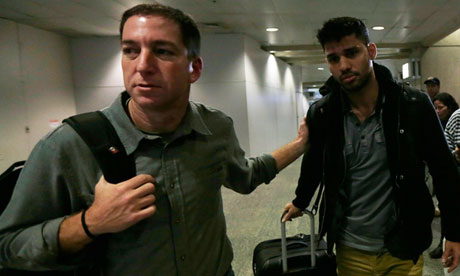by Tony Iozzo
Impunity Watch Reporter, Europe
LONDON, England – The decision of British authorities to detain the partner of a journalist who has reported on both United States and United Kingdom surveillance programs has come under fire, as opposition politicians and human rights lawyers are demanding an explanation.

David Michael Miranda, the partner of journalist Glenn Greenwald, who writes a column for the British newspaper The Guardian, was detained for nine hours before being released without charge.
Greenwald has written about the U.S. and U.K. surveillance programs based on the leaks by former National Security Agency contractor Edward Snowden. Miranda had met with Laura Poitras, an American filmmaker who has worked with Greenwald on the Snowden leaks, in Berlin and was in route to Rio de Janeiro. The Guardian has stated that Miranda, though not an employee of the newspaper, “often assists [Greenwald] in his work,” and the newspaper generally reimburses Miranda for his flights.
During Miranda’s nine-hour detention, the maximum allowed by law, he was questioned by many agents. “I stayed in a room; there were six different agents, entering and leaving, who spoke with me. They asked questions about my whole life, about everything. They took my computer, video game, cellphone, memory thumb drives- everything,” Miranda stated.
The police have stated that Miranda’s detention was lawful under Schedule 7 of Britain’s Terrorism Act 2000, which allows police to detain an individual at an airport, port or international rail station for up to nine hours for questioning about whether they have been involved with acts of terrorism.
“They completely abused their own terrorism law for reasons having nothing whatsoever to do with terrorism,” Greenwald has written in a column.” He opined that his partner’s detention and questioning were “clearly intended to send a message of intimidation to those of us who have been reporting on the NSA and GCHQ.”
Britain’s official independent reviewer of terrorism legislation, David Anderson, stated he has asked authorities to explain why Miranda was detained for the maximum allowable amount of time. Of the 69,000 people stopped pursuant to Schedule 7 between 2011 and 2012, less than 40 people have been held for over six hours.
As Miranda is a Brazilian national, Brazil’s foreign minister Antonio Pariota has sought reasoning from British Foreign Secretary William Hague, calling Miranda’s detention “not justifiable.”
Though the United States government has stated it was given a “heads up” regarding the planned detention, it has stated that the decision for the detention was independent from them.
Greenwald now plans to “write much for aggressively than before” about the U.K.’s surveillance programs. “I’m going to publish many more things about England as well. I have many documents about the system of espionage of England, and now my focus will be there, too. I think they will regret what they’ve done.”
For more information, please see:
Al Jazeera – Snowden Journalist to Publish UK Spy Secrets – 20 August 2013
The Independent – Snowden Affair: US Was Given ‘Heads-Up’ on Detention of David Miranda at Heathrow – 20 August 2013
BBC News – US Given ‘Heads-Up’ on David Miranda Detention – 19 August 2013
The Guardian – David Miranda: “The Said I Would be Put in Jail if I Didn’t Cooperate” – 19 August 2013
New York Times – Britons Question Whether Detention of Reporter’s Partner Was Terror-Related – 19 August 2013
Yahoo News UK & Ireland – Use of UK Terror Law to Detain a Reporter’s Partner ‘a disgrace – 19 August 2013

